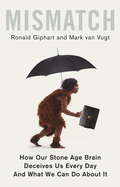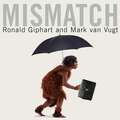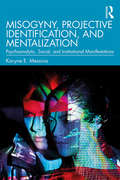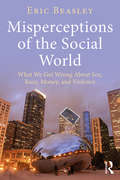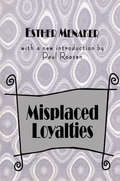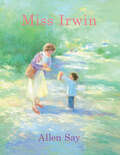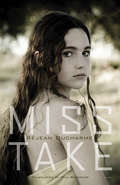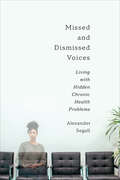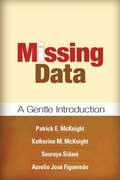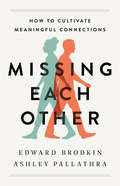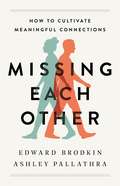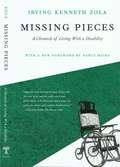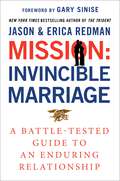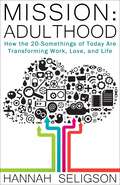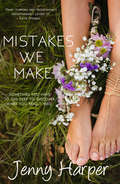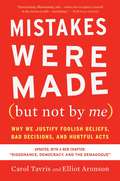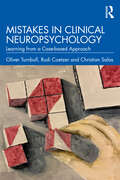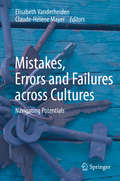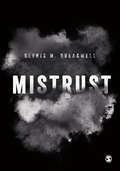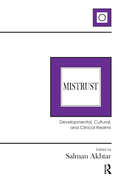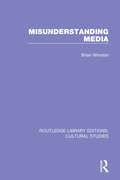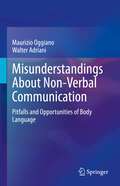- Table View
- List View
Mismatch: How Our Stone Age Brain Deceives Us Every Day (And What We Can Do About It)
by Ronald Giphart Mark van VugtOur brains evolved to solve the survival problems of our Stone Age ancestors, so when faced with modern day situations that are less extreme, they often encounter a mismatch. Our primitive brains put us on the wrong foot by responding to stimuli that - in prehistoric times - would have prompted behaviour that was beneficial. If you've ever felt an anxious fight or flight response to a presenting at a board meeting, equivalent to facing imminent death by sabre-toothed tiger, then you have experienced a mismatch.Mismatch is about the clash between our biology and our culture. It is about the dramatic contrast between the first few million years of human history - when humans lived as hunters and gatherers in small-scale societies - and the past twelve thousand years following the agricultural revolution which have led us to comfortable lives in a very different social structure. Has this rapid transition been good for us? How do we, using our primitive minds, try to survive in a modern information society that radically changes every ten years or so?Ronald Giphart and Mark van Vugt show that humans have changed their environment so drastically that the chances for mismatch have significantly increased, and these conflicts can have profound consequences.Reviewed through mismatch glasses, social, societal, and technological trends can be better understood, ranging from the popularity of Facebook and internet porn, to the desire for cosmetic surgery, to our attitudes towards refugees.Mismatches can also affect our physical and psychological well-being, in terms of our attitudes to happiness, physical exercise, choosing good leaders, or finding ways to feel better at home or work.Finally, Mismatch gives us an insight into politics and policy which could enable governments, institutions and businesses to create an environment better suited to human nature, its potential and its constraints.This book is about converting mismatches into matches. The better your life is matched to how your mind operates, the greater your chances of leading a happy, healthy and productive life.
Mismatch: How Our Stone Age Brain Deceives Us Every Day (And What We Can Do About It)
by Ronald Giphart Mark van VugtOur brains evolved to solve the survival problems of our Stone Age ancestors, so when faced with modern day situations that are less extreme, they often encounter a mismatch. Our primitive brains put us on the wrong foot by responding to stimuli that - in prehistoric times - would have prompted behaviour that was beneficial. If you've ever felt an anxious fight or flight response to a presenting at a board meeting, equivalent to facing imminent death by sabre-toothed tiger, then you have experienced a mismatch.Mismatch is about the clash between our biology and our culture. It is about the dramatic contrast between the first few million years of human history - when humans lived as hunters and gatherers in small-scale societies - and the past twelve thousand years following the agricultural revolution which have led us to comfortable lives in a very different social structure. Has this rapid transition been good for us? How do we, using our primitive minds, try to survive in a modern information society that radically changes every ten years or so?Ronald Giphart and Mark van Vugt show that humans have changed their environment so drastically that the chances for mismatch have significantly increased, and these conflicts can have profound consequences.Reviewed through mismatch glasses, social, societal, and technological trends can be better understood, ranging from the popularity of Facebook and internet porn, to the desire for cosmetic surgery, to our attitudes towards refugees.Mismatches can also affect our physical and psychological well-being, in terms of our attitudes to happiness, physical exercise, choosing good leaders, or finding ways to feel better at home or work.Finally, Mismatch gives us an insight into politics and policy which could enable governments, institutions and businesses to create an environment better suited to human nature, its potential and its constraints.This book is about converting mismatches into matches. The better your life is matched to how your mind operates, the greater your chances of leading a happy, healthy and productive life.
Misogyny, Projective Identification, and Mentalization: Psychoanalytic, Social, and Institutional Manifestations
by Karyne E. MessinaMisogyny, Projective Identification, and Mentalization looks at how the psychoanalytic concepts of projective identification and mentalization may explain the construction of society and how they have enabled misogyny to be expressed in social, political, and institutional settings. Karyne E. Messina explores how misogyny has affected the perception and treatment of women through analysis of a range of examples of individual women and groups. The first part explores projective identification as a mechanism for the suppression of women, looking at the origins of the concept in psychoanalysis and its expansion. The author examines the story of Clara Thompson as an example, arguing that her virtual disappearance from the history of psychiatry and psychoanalysis itself is a telling example of this process at work. The second part of the book uses four examples of individuals, including the recent election loss by Hillary Clinton in 2016, to show that projective identification can (particularly in political and cultural settings) overtake and motivate groups as well as individuals, and lead to violence, atrocity, humiliation, and dismissal of and against women. Part three then features case studies of four groups of women from the 20th century, including victims of the 1994 Rwandan genocide, showing how projective identification against groups has occurred. With specific reference to the erasure of women’s contributions in society, both individually and collectively, and the trauma that arises from the many effects of regarding women as a group as "less" or "other", this is a book which sets a new agenda for understanding how misogyny is expressed socially. Misogyny, Projective Identification, and Mentalization will be of interest to psychoanalysts and psychoanalytic psychotherapists as well as scholars of politics, gender, and cultural studies.
Misperceptions of the Social World: What We Get Wrong About Sex, Race, Money, and Violence
by Eric BeasleyThis volume elucidates some of the very concrete ways in which Americans misperceive the social world and how we are all subject to biases and illusions. As such, it challenges the assumption in much social science theorizing that people are rational actors by exploring how the machinations of cognition, the effect of our past experiences, the news, and social media feeds all factor into our opinion-making process. The chapters highlight common, and often incorrect, perceptions of population diversity, sexual behavior, the economy, health, and relationships. It shows how correcting these misperceptions of the social world can lead to real behavioral and attitudinal change.
Misplaced Loyalties: History of Ideas
by Anselm L. StraussOriginally published in 1989 as Appointment in Vienna, Esther Menaker's Misplaced Loyalties is a fascinating memoir covering five years of student life in Vienna during the early years of the psychoanalytic movement started by Sigmund Freud. It begins in 1930, when, full of high expectations, the author and her husband left their native America and eagerly embarked on an exhilarating journey that would take them to Austria, where they were to become candidates at the Psychoanalytic Institute.
Miss Irwin
by Allen SayMiss Irwin is a luminous and heartwarming story about the importance of capturing the light of precious memories before all is forgotten, from Caldecott Medalist Allen Say.As a young woman, Miss Irwin was a kindergarten teacher who loved introducing the world of discovery to her students. As a grandmother, she often reflects on her wonderful days exploring with her students. When her grandson asks her about a mysterious box on the shelf, she gets lost in memory and her mind transports her back in time to when she was Miss Irwin. At first her grandson is confused, but remembers his grandmother's forgetfulness and plays along as the student who made the bird's nest inside the white box.Allen Say's breathtaking artwork and emotionally powerful and thoughtful text gently weave a touching story about memory and family. Together, the grandmother and grandson rejoice in the meaning and beauty of memory before all is lost.Miss Irwin helps readers of all ages better understand and interact with loved ones who are experiencing memory loss.AUTHOR'S NOTEThe teachers I loved and admired are figures of light in my memory. Miss Irwin is especially luminous. She was my daughter's kindergarten teacher. The children's words and drawings and dancing made her blush with excitement. And by trying to keep her blushing, the children learned the astonishment of discovering.I hope she will forgive me for casting her as a forgetful grandmother in this story -- it's an attempt to capture her light before all is forgotten. -- Allen SayAlzheimer's changes the lives of everyone it touches. You are not alone.When a friend or family member has Alzheimer's disease, you may feel upset, confused or scared. Some people with early-stage Alzheimer's may forget words or not remember your name from time to time. But, when you spend time with people with late-stage Alzheimer's, it is easy to see that something serious is going on. People with Alzheimer's disease are not acting like this because they don't care about you. Changes deep inside their brains are destroying the centers that control remembering, thinking, and feeling. Learning about Alzheimer's disease can help you understand what to expect and how to connect with the person you care about. -- Alzheimer’s Association
Miss Take
by Will Browning Réjean DucharmeSixteen-year-old Miles has run away from home, inviting his childhood companion, the fourteen-year-old Inuit orphan Chateaugué, to join him in a rented flat opposite Notre-Dame-de-Bonsecours in Montreal. There they construct a chaste life for themselves, living as brother and sister. They spend their days riding bicycles wildly through the streets of the city, dodging the automobiles that symbolize for them the adult world they despise, a world that has dominated the landscape with its roadmaps of social discourse. They spend hours at the library, laughing with disdain at how the classics have become venerated, how their authors' words and turns of phrase have become confused with the things and actions they signify. Enthralled by the works of the "mad" poet Nelligan, Miles begins a journal, determined to free language from the constraints of convention, but finds he cannot write anything without immediately conjuring up its opposite.To escape the boredom that history seems to have decreed shall be re-enacted endlessly by all grown-ups, Miles and Chateaugué enter into a suicide pact to preserve their childhood freedom and purity from the debasement of the adult roles pre-ordained for them.Destitute after spending what little money they have, Miles goes to a bar in search of a drink, where he is seduced by an older woman, and suddenly finds himself both attracted and repelled by the pleasures and debasements of the flesh. Having stepped out of their world of childhood innocence, can he return to Chateaugué and consummate their vows, or is this brush with experience irrevocable?Written in a style that echoes the work of Arthur Rimbaud and William S. Burroughs, Ducharme's vision is darkly prophetic of a world that has lost its innocence, and on which "our lady of good help" now only gazes with an inscrutable Mona Lisa smile.
Missed and Dismissed Voices: Living with Hidden Chronic Health Problems
by Alexander Segall PhDThere is a complex relationship between illness and identity. Missed and Dismissed Voices aims to expose the impact of hidden health problems on the daily lives of a growing number of adults who live with chronic conditions and repeatedly face the challenge of trying to maintain their personal sense of healthiness across the life course. The book focuses on the meaning and management of both medically diagnosed chronic diseases and medically unexplained physical conditions or syndromes. In each case, people must decide whether to make their private suffering public. The book includes analysis derived from research literature, combined with illness narrative accounts of people in qualitative interviews and blog posts, to create fictional exemplary case studies for each of the chronic conditions examined. The common issues raised in these stories provide important insights into the process by which people manage to adapt to their changing health status and life circumstances. In this book, Alexander Segall, PhD, gives voice to chronically ill people who often have their life stories either missed or dismissed.
Missing Data
by Patrick Mcknight Katherine McknightWhile most books on missing data focus on applying sophisticated statistical techniques to deal with the problem after it has occurred, this volume provides a methodology for the control and prevention of missing data. In clear, nontechnical language, the authors help the reader understand the different types of missing data and their implications for the reliability, validity, and generalizability of a study's conclusions. They provide practical recommendations for designing studies that decrease the likelihood of missing data, and for addressing this important issue when reporting study results. When statistical remedies are needed--such as deletion procedures, augmentation methods, and single imputation and multiple imputation procedures--the book also explains how to make sound decisions about their use. Patrick E. McKnight's website offers a periodically updated annotated bibliography on missing data and links to other Web resources that address missing data.
Missing Each Other: How to Cultivate Meaningful Connections
by Edward Brodkin Ashley PallathraThe ability to connect with another person and truly be in tune with their physical and emotional state is one of the most elusive interpersonal skills to develop. This book shows you how.In our fast-paced, tech-obsessed lives, rarely do we pay genuine, close attention to one another. With all that&’s going on in the world and the never-ending demands of our daily lives, most of us are too stressed and preoccupied to be able to really listen to each other. Often, we misunderstand or talk past each other. Many of us are left wishing that the people in our lives could really listen, understand, and genuinely connect with us.Based on cutting-edge neuroscience research and years of clinical work, psychiatrist Edward Brodkin and therapist Ashley Pallathra take us on a wide-ranging and surprising journey through fields as diverse as social neuroscience and autism research, music performance, pro basketball, and tai chi. They use these stories to introduce the four pillars of human connection: Relaxed Awareness, Listening, Understanding, and Mutual Responsiveness. Accessible and engaging, Missing Each Other explains the science, research, and biology underlying these pillars of human connection and provides exercises through which readers can improve their own skills and abilities in each.
Missing Each Other: How to Cultivate Meaningful Connections
by Edward Brodkin Ashley PallathraIn our fast-paced, tech-obsessed lives, rarely do we pay genuine, close attention to one another. With all that's going on in the world, and the never-ending demands of our daily lives, most of us are too stressed and preoccupied with our own thoughts and worries to be able to really listen to each other for long. Often, we seem to somehow "miss" each other, misunderstand each other, or talk past each other. Our ability to tune in to ourselves and to others seems to be withering. Many of us are left wishing for someone who could really listen, understand, and genuinely connect with us.In Missing Each Other, researchers and clinicians Edward Brodkin and Ashley Pallathra argue that we must find the ability to be in tune with each other again, and they show us how. Based on years of research that they conducted together in a National Institutes of Mental Health-funded clinical study, the authors take a wide-ranging and surprising journey through fields as diverse as social neuroscience and autism research, music performance, pro basketball, and tai chi. They use these stories to introduce the four principal components of attunement: Relaxed Awareness, Listening, Understanding, and Mutual Responsiveness. They outline the science, research, and biology underlying these pillars of human connection, but also providing readers with exercises through which they can improve their own skills and abilities in each.
Missing Pieces: A Chronicle of Living With a Disability
by Irving Kenneth Zolahe personal odyssey of a man with a disability, this passionate book tries to tell as well as analyze what it is like to have a disability in a world that values vigor and health. Zola writes, "Missing Pieces is an unraveling of a social problem in the manner of Black Like Me. Like its author, I, too, am a trained social observer, but for me 'passing' was not an issue. For I already have the stigmata of the disable - the braces, the limp, the cane - though I have spent much of my life denying their existence." The author started out in the role of a social scientist on a seven-day excursion to acquaint himself with an extraordinary experiment in living - Het Dorp, one of the few places in the world designed to promote "the optimum happiness" of those with severe physical disabilities. Neither a medial center nor a nursing home, Het Dorp is a village in the western-most part of the Netherlands. What began as a sociological attempt to describe this unusual setting became, through the author's growing awareness, what can only be called a socio-autobiography. Resuming his prior dependence on a wheelchair, the author experienced his own transformation from someone who is "normal" and "valid" to someone who is "invalid." The routine of Het Dorp became his: he lived in an architecturally modified home, visited the workshops, and shared meals, social events, conversation, and perceptions with the remarkably diverse residents. The author confronts some rarely discussed issues - the self-image of a person with a chronic disability, how one fills one's time, how one deals with authority and dependence, and love and sex. Missing Pieces offers striking insights into an aspect of the human condition shared by nearly 30 million Americans. It is must reading for the general reader, as well as for the rehabilitation counselor, social worker, or social scientist. Author note: Irving Kenneth Zola (1935-1994) was Professor of Sociology at Brandeis University and a founding member and counselor at the Boston Self-Help Center. Nancy Mairs is the author of seven books, including Waist-High in the World: A Life Among the Disabled, and most recently, A Troubled Guest: Life and Death Stories. She lives in Tucson with her husband, George.
Mission: A Battle-Tested Guide to an Enduring Relationship
by Jason Redman Erica RedmanFrom Jason Redman, the former Navy SEAL and New York Times bestselling author of The Trident, writing with his wife, Erica, a battle-tested guide to marital bliss, drawing on the lessons of elite warriors to build a winning relationship, no matter the challenges and traumas that life sends your way. Featuring a foreword by Gary Sinise.The divorce rate among Navy SEALs is over 90 percent, and the rate among severely wounded warriors is even higher. Erica and Jason Redman knew their marriage faced an uphill climb, because Jason is both.In 2007, Jason’s patrol was ambushed by a machine gunners’ nest in Iraq. Thirty-seven surgeries, 1,200 stitches, and a grueling years-long rehab would follow. Despite all that—plus the daily demands of raising three children and running a successful business together—Jason and Erica’s marriage has remained invincible.Every day, you make choices that either build up your relationship or leave it exposed and vulnerable to attack. The highest-performing warrior teams pay attention to developing muscle-memory habits, and your marriage can benefit from the same focus.In Mission: Invincible Marriage, Jason and Erica share the tools they use to lay the foundational beliefs and communication skills a marriage needs to last for life. Each chapter helps readers develop a key tenet of successful relationship-building. Among them:Commit to Friendship: The foundation of all successful marriages is genuine friendshipSupport Each Other’s Dreams: Couples who establish a pattern of supporting each other’s dreams can thrive even when those dreams grow and changeKnow When to Give Space: Learn to trust each other enough to give and take space when needed instead of resorting to passive-aggressive responses and stonewallingEstablish Rituals: Couples can strengthen their marriage by finding ways to invest in small shared actions that reflect and reinforce commitmentFace Conflict Together: Marital strength is not the absence of conflict but the ability to withstand and work through conflictDrawing on their own experiences and the latest research in long-term interpersonal relationships, Mission: Invincible Marriage is a battle-tested guide to nurturing love, especially when the going gets tough.
Mission: How the 20-Somethings of Today Are Transforming Work, Love, and Life
by Hannah SeligsonGen Y has been picked apart by analysts, statistics, and trend reports, which often portray 20-somethings in negative, one-dimensional terms like "entitled" and "whiners". In this thought-provoking new book that aims to dispel these stereotypes, journalist Hannah Seligson chronicles the lives of seven individuals who embody this generation, exploring their challenges and ambitions in vivid detail and sketching a picture, through their eyes, of what life is actually like for young adults. Through these first-hand stories, readers will discover the transformational effect this enterprising, open-minded, innovative, and diverse generation is having on society."Zeitgeist reporter Hannah Seligson details this new path to adulthood in a book that promises to be illuminating, surprising, and provocative— both for Gen Y readers themselves and for people who want to understand this charming yet sometimes infuriating generation. I need this book. What is "nexting" and "jacked"? —Gretchen Rubin, New York Times Bestselling Author of THE HAPPINESS PROJECT and HAPPIER AT HOME
Mistakes We Make
by Jenny HarperSometimes you have to dig deep to discover what you really need.Marketing events manager Molly Keir doesn't realise how much she still cares for her ex until she meets him with another woman. Her answer is to seize the chance of a glittering job in London - even though this will mean leaving behind her aging father and pregnant best friend Lexie Gordon.Adam Blair is in the wrong job. Pressured by his father to join the family law firm, the stress of work helped break his marriage. Now Molly is moving to London, and he knows he needs to move on - but events soon overtake his best intentions.A year ago, Caitlyn Murray quit her well-paid job to avoid becoming a whistleblower. Now she is stuck at home with her overworked mother and four needy step-siblings. Tempted by the offer of a good wage, she returns to her old firm - where her nightmare comes back to haunt her.Molly and Adam seem to have gone too far to recover the love they once had, and when Caitlyn finds the courage to speak out, she brings all their worlds tumbling down.
Mistakes We Make
by Jenny HarperSometimes you have to dig deep to discover what you really need.Marketing events manager Molly Keir doesn't realise how much she still cares for her ex until she meets him with another woman. Her answer is to seize the chance of a glittering job in London - even though this will mean leaving behind her aging father and pregnant best friend Lexie Gordon.Adam Blair is in the wrong job. Pressured by his father to join the family law firm, the stress of work helped break his marriage. Now Molly is moving to London, and he knows he needs to move on - but events soon overtake his best intentions.A year ago, Caitlyn Murray quit her well-paid job to avoid becoming a whistleblower. Now she is stuck at home with her overworked mother and four needy step-siblings. Tempted by the offer of a good wage, she returns to her old firm - where her nightmare comes back to haunt her.Molly and Adam seem to have gone too far to recover the love they once had, and when Caitlyn finds the courage to speak out, she brings all their worlds tumbling down.
Mistakes Were Made (but Not By Me) Third Edition: Why We Justify Foolish Beliefs, Bad Decisions, and Hurtful Acts
by Elliot Aronson Carol TavrisA NEW EDITION UPDATED IN 2020 • Why is it so hard to say "I made a mistake" — and really believe it? When we make mistakes, cling to outdated attitudes, or mistreat other people, we must calm the cognitive dissonance that jars our feelings of self-worth. And so, unconsciously, we create fictions that absolve us of responsibility, restoring our belief that we are smart, moral, and right—a belief that often keeps us on a course that is dumb, immoral, and wrong. Backed by decades of research, Mistakes Were Made (But Not by Me) offers a fascinating explanation of self-justification—how it works, the damage it can cause, and how we can overcome it. Extensively updated, this third edition has many recent and revealing examples, including the application of dissonance theory to divisive social issues such as the Black Lives Matter movement and he said/she said claims. It also features a new chapter that illuminates how cognitive dissonance is playing a role in the currently polarized political scene, changing the nation&’s values and putting democracy itself at risk. &“Every page sparkles with sharp insight and keen observation. Mistakes were made—but not in this book!&” —Daniel Gilbert, author of Stumbling on Happiness &“A revelatory study of how lovers, lawyers, doctors, politicians—and all of us—pull the wool over our own eyes . . . Reading it, we recognize the behavior of our leaders, our loved ones, and—if we&’re honest—ourselves, and some of the more perplexing mysteries of human nature begin to seem a little clearer.&” —Francine Prose, O, The Oprah Magazine
Mistakes in Clinical Neuropsychology: Learning from a Case-based Approach
by Oliver Turnbull Rudi Coetzer Christian SalasThis innovative book uses a case-based approach to discuss mistakes made in the practice of clinical neuropsychology to form a helpful tool in the training of early career clinicians. By allowing readers space for critical reflection during clinical practice, the book teaches competency in clinical neuropsychology, through the examination of errors as a central part of the learning process. The core of this book is a diverse series of mistakes, each embedded as a patient narrative. Each chapter is based around an example error, typically one that was made, by the authors, as early career clinicians. Early chapters focus on mistakes in neuropsychological assessment, and the diagnostic process. Later chapters focus on errors in rehabilitation and management. Each chapter is framed to reflect the situational context, for example the role of history, what constitutes normal performance, the way that complex tasks rely on foundational skills, or the treatment of patients with dysexecutive impairment. Towards the end of each chapter there is reflection on the nature of each error type. As such, each chapter follows the structure SEER (Situation, Example, Error, Reflection), helping the reader to imagine the situation around the mistake, its nature and relevance. The book especially emphasises small phrases of insight (axioms, or gnomes) that are widely used by experienced clinicians. This is valuable reading for students of clinical neuropsychology, occupational therapy and speech and language therapy as well as professionals in these fields such as neurologists, psychiatrists and other rehabilitation therapists. It is especially appropriate for those in the earlier stages of their career in clinical neuropsychology, or in related disciplines which involve the assessment and treatment of patients with neurological disorders that impair cognition or disrupt the regulation of emotion. However, experienced clinicians will also find it includes interesting insights to improve their practice.
Mistakes, Errors and Failures across Cultures: Navigating Potentials
by Elisabeth Vanderheiden Claude-Hélène MayerThis volume provides comprehensible, strength-based perspectives on contemporary research and practice related to navigating mistakes, errors and failures across cultures. It addresses these concepts across cultural contexts and explores any or all of these three concepts from a positive psychology or positive organisational perspective, highlighting their potential as resources. The volume further discusses the consequences of errors and failures at individual, organisational and societal levels, ranging from severe personal problems to organisational and collective crises, perspectives how those can be turned into opportunities for contingent and sustainable improvement processes. The book shows that there are significant cultural differences in the understanding, interpretation and handling of errors and failures. This volume provides practical guidance for transcultural understanding of mistakes, errors and failure through new models, ideas for self-reflection, therapeutic and counselling interventions and organisational change management processes. This book is a must for researchers and practitioners working on mistakes, errors and failures across cultures and disciplines!
Mistrust
by Glynis M. BreakwellMistrust in the 21st century is a major societal concern. This book: - explores social psychological processes that explain why and how mistrust develops - considers the effects that it has upon those who are mistrustful and those who are mistrusted - offers a model of mistrust in individuals and communities which is based on theories of identity and social representation. With examples ranging from the the 1872 US presidential election to the Trump era, it also considers Brexit, and has a significant focus on the Covid-19 pandemic. By looking at the role of social media, and how mistrust can be weaponised this book interrogates its place in our society. Ultimately, whilst feeling mistrust is part of being human this book warns that we ignore mistrust at our peril. Dame Glynis M. Breakwell is Professor Emeritus at the University of Bath in the Department of Psychology and has Visiting Professorships at Imperial College, London, University of Surrey and Nottingham Trent University.
Mistrust
by Glynis M. BreakwellMistrust in the 21st century is a major societal concern. This book: - explores social psychological processes that explain why and how mistrust develops - considers the effects that it has upon those who are mistrustful and those who are mistrusted - offers a model of mistrust in individuals and communities which is based on theories of identity and social representation. With examples ranging from the the 1872 US presidential election to the Trump era, it also considers Brexit, and has a significant focus on the Covid-19 pandemic. By looking at the role of social media, and how mistrust can be weaponised this book interrogates its place in our society. Ultimately, whilst feeling mistrust is part of being human this book warns that we ignore mistrust at our peril. Dame Glynis M. Breakwell is Professor Emeritus at the University of Bath in the Department of Psychology and has Visiting Professorships at Imperial College, London, University of Surrey and Nottingham Trent University.
Mistrust: Developmental, Cultural, and Clinical Realms
by Salman AkhtarHumans are weak. Lacking the claws and thick skins of other animals, we are forced to rely on members of our own species to survive and flourish in the world. The fact that the human infant is born in an utterly helpless state also makes others' protective care necessary. Attachment, bonding, concern, and mutuality thus become cornerstones of human existence. Trust also enters this equation. Originating in the early mother-child relationship, trust continues to grow, get contextually refined tempered by reality testing, and gain nuances throughout the subsequent adult life. Its absence (mistrust) or malformation (distrust) contributes to psychopathology and is responsible for much intrapsychic distress and interpersonal strife. Given its formative significance and it crucial role in the therapeutic process, one is surprised by the paucity of psychoanalytic writings specifically devoted to the topic of trust and mistrust. Few, if any, monographs on trust exist. A collection of essays written specifically for this volume, it deals with the ontogenesis, psychopathology, cultural vicissitudes, and technical implications of trust and mistrust.
Misunderstanding Media (Routledge Library Editions: Cultural Studies)
by Brian WinstonThe 1980s saw constant reports of an information revolution. This book, first published in 1986, challenges this view. It argues that the information revolution is an illusion, a rhetorical gambit, an expression of profound historical ignorance, and a movement dedicated to purveying misunderstanding and disseminating disinformation. In this historically based attack on the information revolution, Professor Winston takes a had look at the four central information technologies – telephones, television, computers and satellites. He describes how these technologies were created and diffused, showing that instead of revolution we just have ‘business as usual’. He formulates a ‘law’ of the suppression of radical potential – a law which states that new telecommunication technologies are introduced into society only insofar as their disruptive potential is contained. Despite the so-called information revolution, the major institutions of society remain unchanged, and most of us remain in total ignorance of the history of technology.
Misunderstandings About Non-Verbal Communication: Pitfalls and Opportunities of Body Language
by Maurizio Oggiano Walter AdrianiIn our daily lives, communication is prevalent. We don't just communicate because we want to; we need to. Often, we use words to understand each other. However, there are times when we observe people and try to comprehend their intentions. We rely on "body language". This reliance propagates the misleading idea that people communicate with their bodies just as they do with words. This is where misunderstandings frequently occur, sometimes even due to incorrect concepts propagated by so-called experts. The result is a loss of trust among readers or, worse, the disruption of interactions and relationships. Through a science-based approach, this work is primarily dedicated to all readers aged 18 and above who are passionate about communication and keen to understand others. Additionally, professionals from various sectors will find practical concepts and references for research, study, and daily work.
Mit ADHS erfolgreich im Beruf: So wandeln Sie vermeintliche Schwächen in Stärken um
by Heiner LachenmeierWas ist ADHS, und vor allem, wie verhalten sich Menschen mit ADHS? Was bedeutet das für das Erleben der Betroffenen, welchen Einfluss hat es auf ihren Zugriff auf ihre Fähigkeiten, und wie wirkt sich das auf das Arbeitsleben aus?Ausgehend von diesen Fragestellungen zeigt der Autor erstmals aus wissenschaftlicher Sicht und in leicht verständlicher, gut konsumierbarer und nicht zuletzt humorvoller Form auf, wie sich ADHS auf das Arbeitsleben auswirkt und welche Chancen sich mit einem besseren Verständnis dieser neurologischen Variante auftun können. Denn unter bestimmten Bedingungen kann ADHS in einigen Arbeitsbereichen klare Vorteile bieten! Selbstverständlich werden aber auch mögliche Schwierigkeiten im Berufsleben beleuchtet und dafür konkret umsetzbare Lösungswege aufgezeigt. Leser mit und ohne ADHS werden die spezielle Aufarbeitung dieses wichtigen Themas ebenso schätzen wie die leichte Umsetzbarkeit der vielen praktischen Tipps&Tricks, die aus zahlreichen Studien und der langjährigen intensiven Arbeit des Autors mit Betroffenen – und dem eigenen ADHS - resultieren. Auch Jugendliche und junge Erwachsene sowie deren Eltern finden hier hilfreiche Unterstützung, um möglichst erfolgreich in der Arbeitswelt durchzustarten – mit, trotz oder gerade wegen ADHS!
